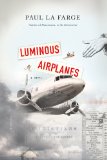Summary | Excerpt | Reviews | Beyond the Book | Readalikes | Genres & Themes | Author Bio

A Novel
by Paul LaFarge
I came home from the festival on Sunday night. The next day was a holiday, and because I still didn't know what to do, I went for a walk. The air was hot, and the sky was the bright, uninterrupted blue you get in San Francisco in the late summer, a sky so blue it looks opaque, as though it were just as hell hung over the city, hiding the real weather. It was the end of Labor Day weekend and the Mission was quiet. It made me think of when I first came to the city, before the boom of the nineties, when this had been a savage neighborhood, where crazy people and heroin addicts sat at the mouths of alleys, looking up at you with flat, hurtful eyes. Then money came and swept those people away; it replaced them with stores specializing in a single brand of shoe, and restaurants named with a compound of the word fire. Now, in September 2000, the restaurants were in trouble. Signs in their windows offered seven-dollar lunch specials and still no one came to fill their chrome-edged tables, their cushioned nooks. I walked up to Dolores Park, which was empty, apart from some children swinging in the playground and a handful of dogs wearied by the hot weather, walking around with their heads down, like people looking for change in the grass. From the top of the park I could see downtown San Francisco, the gray towers of the Bay Bridge, the brownish line of Berkeley beyond. And beyond that was all of California, Nevada, Utah, et cetera, all the way to New York State, to Thebes. But my ambivalence about San Francisco had vanished as I climbed the hill; the city was beautiful and I wanted to live there forever. I sat on a bench, relieved that I had come home from the festival when I did - if I'd returned a day earlier I would have had to bundle myself onto a plane for the funeral. My phone buzzed in my pocket. It was Alice, my ex-girlfriend, calling to see if I was back yet.
"I'm back," I said, "but my grandfather died."
"What?"
I told her what had happened, and how my mothers had the funeral without me because of Marie's job at S.
"God, how vile," Alice said. "Do you want to come over?"
Alice and I had broken up months before, but we still saw each other more often than we saw anyone else, or at least, I saw her more often than I saw anyone except my coworkers. Our conversations were frequently difficult, but Alice was the only person who made me feel solid. If we threw ourselves together at least a collision would happen.
"I'm tired," I said, "I want to stay in my neighborhood. Do you want to come here?"
"You're so far away," Alice said.
I lived twenty minutes from her by foot, or half an hour on the bus. Finally we agreed to meet at the Doghouse, a bar halfway between her apartment and mine. It looked like bikers went there, so no one else went, though in fact the bikers didn't go there either.
LOST THINGS
For a long time, from when I was very little and don't remember years or stories, until I was thirteen, I spent every summer with my grandparents in Thebes. My mothers would have preferred to send me somewhere else, but they didn't have the money for summer camp, and the free day programs in New York were frightening: this was the scary seventies, when the city was almost bankrupt and you could get attacked with a knife on the Upper West Side in the daytime. But I couldn't just stay at home, because there was nothing for me to do, and my mothers wanted a vacation from being parents, a job neither of them had ever wanted to turn into a career. The summer was their time to make art, which was what they really did: Celeste was a sculptor and Marie took photographs. So, Thebes. I looked forward to it every year as soon as the trees began to blossom in Riverside Park. They produced flowers and I produced memories: of the man-made lake with the sandy beach, of the green mountains that rose up on either side of town, the stream, or kill, that ran through the middle of it, the old wooden bridge that crossed the stream, and the cool hollow under the bridge. I remembered the Regenzeit childrenwho lived next door to my grandparents, Kerem and Yesim, pronounced YAY-shum, which were Turkish names because their parents were Turkish although they, the children, had grown up in the U. S. of A. The first days of spring tortured me; the future tied my thought in knots. By the time June came around, I watched my mothers as a hungry dog watches its humans, waiting for the sign that it was time for me to go. But my mothers were proud. They ran away from Thebes when they were seventeen, and had vowed never to go back; sending me to stay with my grandparents wasn't breaking their promise, exactly, but it was close, and their way of keeping themselves aloof from this difficult fact was to pretend that it wouldn't happen.
Copyright © 2011 by Paul La Farge




The only completely consistent people are the dead
Click Here to find out who said this, as well as discovering other famous literary quotes!
Your guide toexceptional books
BookBrowse seeks out and recommends the best in contemporary fiction and nonfiction—books that not only engage and entertain but also deepen our understanding of ourselves and the world around us.